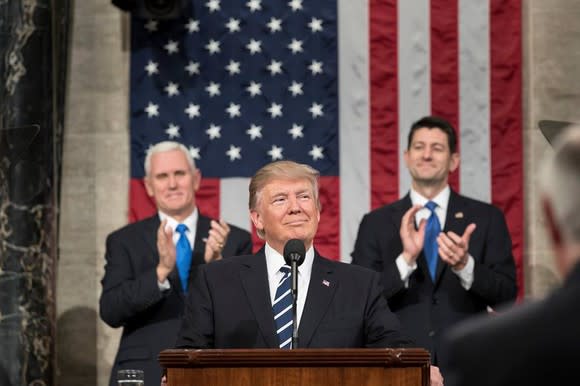Ending Obamacare's Individual Mandate Would All but Kill an Already Compromised Law
The winds of change are in the air in Washington, and it has absolutely nothing to do with turkey dinners and pumpkin-spiced lattes. The long-awaited tax reform from Republicans, the current majority party of the legislative branch, is beginning to take shape.
In recent weeks, both House and Senate Republicans have released their versions of tax reform, with upcoming debates expected to yield a middle ground. At the center of these reforms is a cut to individual income tax rates, as well as a slashing in corporate income tax rates. The GOP believes that lowering corporate taxes should lead to higher employment and wages, as well as boost GDP via consumption. Of course, this is just one of dozens of changes highlighted in the GOP tax plan.

Image source: Getty Images.
But the big hurdle for the Republican Party is figuring out how to generate additional revenue and/or cut expenses in order to not add an estimated $1.5 trillion to the federal deficit over the next decade. And they need to do this with at least 50 of 52 GOP Senators voting in favor of the bill, which as we saw with healthcare reform is not a given.
However, this past week, Senate Republicans may have figured out a way to kill two birds with one stone.
Senate Republicans want to pull the plug on Obamacare's individual mandate
On Tuesday, Nov. 14, it was announced that Senate Republicans would include a measure in their tax plan that would repeal the Affordable Care Act's individual mandate. The individual mandate is the requirement attached to the health law that you purchase health insurance or pay an annual penalty for noncompliance. This penalty is the greater of $695 of 2.5% of household modified adjusted gross income.
Repealing the individual mandate would save an estimated $338 billion through 2027, or more than 20% of the deficit still to be covered by the GOP's tax reform, according to the Congressional Budget Office (CBO).
At this point, you might be wondering how repealing a mandate with an attached penalty would save the federal government money. The answer is that while penalty revenue (which wasn't very much in the first place) would no longer exist, fewer Americans would be insured as a result of the mandate going away. In other words, the federal government would be on the line for hundreds of billions less in subsidies over the next decade, saving it $338 billion.

Image source: Getty Images.
But there's a cost to such a measure. Removing the mandate requiring consumers to buy health insurance means healthier young adults, who are vital to the stability of Obamacare (the more common name for the ACA) and provide balance to the higher costs insurers face by covering sicker patients, would likely remain on the sidelines. This means 13 million fewer people covered by 2027, and the expectation that insurance premiums would rise by another 10%, beginning in 2019 when the mandate elimination would go into effect, according to the CBO. That's right, folks, another 10% premium increase, which would follow the average benchmark plan increase in 2018 of 37%. Benchmark plans are the second-lowest-cost silver plan.
And that's not the only potential consequence. While the uninsured might breathe a sigh of relief for no longer owing a penalty, insurers may respond by running for the exits. Without a mandate in place, there's virtually no incentive for healthier adults to enroll, making the adverse selection process (i.e., where a disproportionate number of sick people enroll) even more apparent. That means bigger losses for insurers that don't significantly increase their premiums.
As a result, many could choose to reduce their presence or back away from the ACA exchanges altogether. National insurers Aetna (NYSE: AET) and Humana (NYSE: HUM) already announced their exit from the individual ACA market earlier this year, while UnitedHealth Group (NYSE: UNH), the nation's largest insurer, slashed its state-based coverage by more than 90% in 2017.
This could be the nail in the coffin for Obamacare
Of course, the dismantling of Obamacare began long before the Senate considered repealing the individual mandate.

Image source: President Donald J. Trump's official Facebook page. Photo by Shealah Craighead.
President Trump recently announced the end of cost-sharing reductions, or CSRs. These are one of the two core subsidies tied to Obamacare that are given to qualifying Americans earning less than 250% of the federal poverty level and who purchased a silver-level plan. CSRs reduce the cost of copays, coinsurance, and deductibles tied to seeing a medical professional. Therefore, ending CSRs means low-income individuals and families may no longer be able to afford their portion of the costs associated with a visit to the doctor. The removal of CSRs, which was tied to a lengthy court case that Republicans won in 2016, is the reason why the average benchmark plan is rising by 37% next year.
On top of this, Obamacare's Shared Responsibility Payment (SRP), which is the aforementioned "penalty" you pay for not purchasing health insurance, hasn't come close to doing its job. In December 2015, the Kaiser Family Foundation estimated that the average household SRP in 2016 would be $969. Comparatively, the average annual cost for a bronze-level plan in 2017, per HealthPocket, was over $3,700, and the average benchmark plan in 2018 would run more than $4,900 annually in premium costs. Running the math, it's been much less costly for healthy young adults to remain uninsured and take the penalty than it would have been for them to buy health insurance. That's a complete failure of the SRP and individual mandate.
Should the GOP move forward with the Senate proposal to end the individual mandate and this provision gets signed into law within a larger tax reform bill, my belief is that you can all but kiss Obamacare goodbye.
More From The Motley Fool
6 Years Later, 6 Charts That Show How Far Apple, Inc. Has Come Since Steve Jobs' Passing
Why You're Smart to Buy Shopify Inc. (US) -- Despite Citron's Report
Sean Williams has no position in any of the stocks mentioned. The Motley Fool recommends UnitedHealth Group. The Motley Fool has a disclosure policy.

